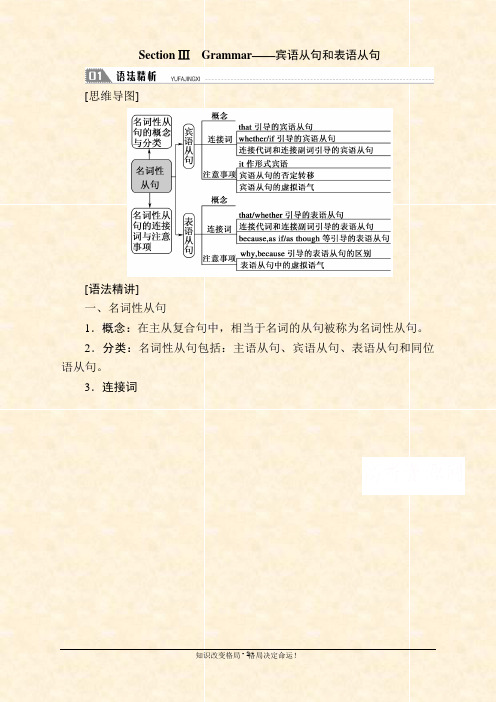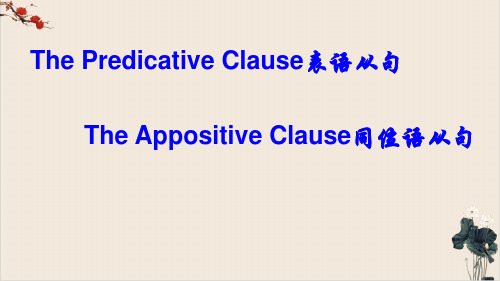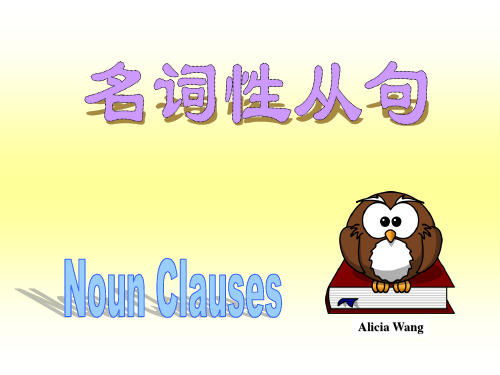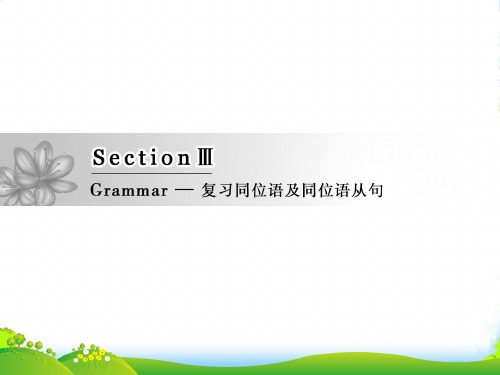英语人教版必修学案:Unit Section Ⅲ Grammar——同位语从句
英语人教版必修学案:Unit Section Ⅲ Grammar——宾语从句和表语从句

Section ⅢGrammar——宾语从句和表语从句[思维导图][语法精讲]一、名词性从句1.概念:在主从复合句中,相当于名词的从句被称为名词性从句。
2.分类:名词性从句包括:主语从句、宾语从句、表语从句和同位语从句。
3.连接词4.注意事项(1)名词性从句要用陈述语序;(2)主从句的时态要基本呼应,有时需用虚拟语气;(3)注意某些连接词的特殊用法(见后)。
二、宾语从句在主从复合句中作动词或介词宾语的从句叫作宾语从句。
1.(1)that 引导的宾语从句I believe (that) you have done your best and that everything will go well.我相信你已经尽力了,而且一切都会好起来的。
He said (that) you were too young to understand the matter and that you were asked not to care about it.他说你太年轻,还无法理解这件事情,你不用去管它。
[名师点津]that 引导的宾语从句有时可作直接宾语。
She told me that she would accept my invitation.她对我说她会接受我的邀请。
(2)whether 或if 引导的宾语从句whether 或if 引导宾语从句时,在句中不充当成分,但是含“是否”之意,从句要用陈述语序。
I wonder whether/if we'll finish the task on time.我不知道我们能否按时完成这项任务。
I'll see whether/if I can advise him to accept it.我要看看我是否能劝他接受。
[名师点津]whether 和if 引导宾语从句时的区别(3)连接代词和连接副词引导的宾语从句连接代词who, whom, whose, what, which, whatever, whoever, whomever, whichever 和连接副词when, where, how, why。
《必修三语法同位语从句》教案

《必修三语法同位语从句》教案课时安排:2课时教学目标:1.理解同位语从句的概念及其功能;2.能够正确辨别同位语从句;3.能够正确运用同位语从句进行语句连贯性的表达。
教学重点:1.同位语从句的概念及其功能;2.同位语从句的辨别和运用。
教学难点:1.同位语从句与定语从句的区分;2.同位语从句的语句连贯性运用。
教学准备:1.教师准备课件、单词卡片等教学辅助材料;2.学生准备笔记本和笔。
教学步骤:Step 1:导入教师通过呈现一些例句,引出同位语从句的概念,并与学生一起探讨同位语从句与定语从句的区别。
Step 2:讲解1.讲解同位语从句的定义及其功能;2.通过例句进一步说明同位语从句的使用方法和语法结构;3.梳理同位语从句的引导词和连接词。
Step 3:练习1.让学生进行同位语从句的辨别练习,帮助他们理解同位语从句的特点;2.给学生一些句子,让他们在句子中添加同位语从句,加深对同位语从句的运用。
Step 4:拓展1.让学生自己创造句子,运用同位语从句;2.给学生作业,让他们在书面作文中运用同位语从句。
Step 5:总结总结同位语从句的概念、功能和用法,让学生对同位语从句有一个清晰的认识。
教学反馈:1.回答学生提出的问题;2.纠正学生在练习中出现的错误。
课堂作业:1.完成相关习题;2.用同位语从句为下节课做准备。
教学延伸:1.教师可邀请学生准备一些句子,进行同位语从句的猜测和辨别,增强学生对同位语从句的理解。
2.教师可通过视频、游戏等多种形式,让学生在课外多次练习同位语从句的使用,提高学生的语言能力。
人教版高一英语必修3宾语从句与表语从句详细讲解及练习

Grammar 宾语从句与表语从句名词性从句在复合句中起名词作用的从句叫做名词性从句。
名词性从句的作用相当于名词,因此主语从句、表语从句、宾语从句和同位语从句分别作主句的主语、表语、宾语和同位语。
主语从句:Who will win the match is still unknown.宾语从句:I want to know what he has told you.表语从句:The fact is that we have lost the game.同位语从句:The news that we won the game is exciting.引导名词性从句的连接词可分为三类:连接词(不充当从句的任何成分):that ,whether ,if连接代词:what, who, whom, whose, which, wh+ever连接副词:when ,where ,how ,whyObject Clauses 宾语从句请对应写出句子成分I know him.()()()I know who he is.()()()请用横线画出下面句子的宾语从句部分。
1、I know him.2、Do you have the time?3、I think that she is beautiful.4、Why don’t you pay attention to me?总结:宾语通常位于谓_____________或者_____________后一、宾语从句的概念:宾语从句在复合句中作主句的宾语。
位置:通常放在主句谓语动词(及物动词)或介词之后。
句子结构:主句+连词(引导词)+ 宾语从句e.g. She asked if these answers were right.We can learn what we do not know.He will talk to us about what he saw in the U.S.A.I don’t know where we will hold the meeting.通过观察,我们可以知道宾语从句的语序用陈述语序:连接词+主语+谓语+其他成分练习:1)Could you tell me______.A. you will get here whenB. when will you get hereC. get here when you willD. when you will get here2) Mother asked his son what ______for lunch at school.A. did he hadB. does he hadC. he hasD. he had3) Pointing to the young plant, he asked me ____ that was the one we had seen in the picture.A. whatB. ifC. whereD. how二、连接词1、从属连接词(不充当从句的任何成分):that ,whether ,if1)、I hear (that) he will be back in an hour.2)、I want to know if /whether he will go to the park with us注:1、由that 引导的陈述句性的宾语从句,在很多动词如say, think, wish , hope, see, believe, agree, expect, hear , feel等动词后。
《导学案》高中英语(人教版必修3)教师用书:Unit3Period3Grammar练习.doc

I •完形填空 The train moved back and forth, its wheels producing more loud sounds than ever against the tracks. Outside the window was just the ]cold of winter. The carriage was filled with frozen selPcentered, bored 2 ・ Suddenly a little boy 3 his way through grown-up legs. 4 his father stayed by the door, the boy satnext to the window, surrounded by 5 , half-awake adults. What a brave child, I thought. As the train entered a tunnel (隧道),something totally 6 happcncd.Thc little boy slid down from his scat and put his 7 on my knee ・ For a moment, I thought that he wanted to go 8 me and returned to his father, so I moved a bit. But instead of moving on, the boy held his9 up towards me. He wanted to tell me something, I thought. I 10 to listen to what he had to say. Wrong11 ! He kissed me softly on the cheek ・ Then he returned to his 12 , settled down and cheerftiHy started looking out of the window. But I was 13_.What happened? A kid kissing an unknown grown-up on the train? To my amazement, the kid 14 to kiss all my neighbors・Nervous and puzzled, we looked questioningly at his father. 44HeDs so happy to be 15・'、the father said/'He^s been very sick." The train stopped and the father and son got off and 16 into the crowd. The doors closed.On my cheek I could still 17 the childDs kiss —a kiss that had caused 18 soul-scarching. How many grown-ups go around kissing each other 19 the joy of being alive? What would happen 20 we all just started being ourselves?The little boy has given us a sweet but serious lesson : Don_t let yourself die before your heart stops!【语篇解读】作者在坐火车的途中和许多乘客一样被一个小孩亲吻了脸颊,这个小孩曾经病得很重,但他现 在因为活着而高兴。
人教版必修三unitGrammar表语和同位语从句课件6

(1)2).T补h出e省略q句u中es的t省io略n成分is;if he will come.
5、君主专制制度(中央集权制度):战国时期韩非提出,秦朝秦始皇创立,直到清朝。
2.用副词“乃”“则”“即”w“h皆e”th等e表r 判断。
3).His suggestion is that the thief _(_s_h_o_u_l_d_)__b_e_s_e_n_t__(send) to the police
station.
改正下列句子并总结原因:
2.引导表语从句 只能whether不能用if。 6、汉武帝实施刺史制度,监视13州部;东汉末年,该刺史为州牧,统领地方军政。
(6)不符合招标文件中规定的其他实质性要求。 2、钢瓶的检查制度 7.6做好进出站加气车辆的交通、防火安全工作。严格按规章制度和操作规程执行。
项
一.定义
Summary :一般的,同位语成分是对其前面的名词或代词进行 __解_释___和 __说__明___ 。我们把对前面的_抽__象__ 名词进行解 释、 说明的从句称为_同__位__语_ 从句 。
The Predicative Clause表语从句 The Appositive Clause同位语从句
The Predicative Clause表语从句
位
连
注
接
意
置
词
事
项
一.表语从句位置 在be,seem,remain , look 等连系动词后由句子充当表 语,这个句子就称之为表语从句
1.The fact is that I earned my passage by working as an unpaid hand.
2015-2016学年高一英语学案unit5period3《grammar》(人教版必修3)

Period 3 Grammar1.通过对构词法的学习,扩大学生的词汇量,并培养学生的词汇生成能力。
2.识记、理解并能正确运用同位语从句。
1.通过对教材P36~37的阅读,掌握构词法和同位语从句的基本用法。
2.学会根据句子的真实情境来学习同位语从句。
品句填空1.She likes to c with grandma over the phone.2.He went to Australia in the 1980s and s down there.3.What she saw t her and she had bad dreams every night after that.4.The man that survived the earthquake was s better yesterday.5.There are seven c in the world, of which Asia is the largest.6.The (距离) between the two villages is two kilometers.7.She gives the (印象) of being older than she really is.8.The man has (宽阔的) shoulders and looks handsome.9.I ll go (市区) tomorrow. Do you want to go with me?10.They arrived in New York at (黎明) the next day.【答案】1.chat 2.settled 3.terrified 4.slightly5.continents6.distance7.impression8.broad9.downtown 10.dawn同位语从句仔细观察下列句子,并注意画线部分的用法。
They were wild with joy at the news that their team had won. 当听到他们队获胜的消息时,他们欣喜若狂。
人教版英语必修三Unit3Grammar

时不用if.
1. I asked her _if_/_w__h_e_t_h_e_r she had a bike. 2. _W_h__e_th_e__r we will hold a party in the open
air tomorrow depends on the weather. 3. We’re worried about _w__h_e_t_h_e_r he is safe. 4. I don’t know _w__h_e_th__e_r_/_if_ he is well or not. 5. I don’t know _w_h_e__th_e_r_ or not he is well. 6. The question is _w_h__e_th_e_r_ he should do it. 7. The doctor can hardly answer the question
Alicia Wang
在复合句中起名词作用的从句叫名词性从 句(Noun Clauses)。名词性从句的功能相 当于名词或名词词组, 它在复合句中能担
任主语、宾语、表语、同位语、介词宾语
等,因此根据它在句中不同的语法功能,
名词性从句又可分别称为主语从句、宾语 从句、表语从句和同位语从句。
{His job is important. What he does is important. This is his job.
1. I don’t think __(t_h_a_t_)_ she is coming. 2. It is a pity __t_h_a_t__ he has made such a
mistake. 3. The reason is ___th_a_t__ he is careless. 4. The news __t_h_a_t__ our team won the
高中英语人教版选修八课件:Unit+2+Section+Ⅲ+Grammar—复习同位语及同位语从句

词的后面, 对前面的名词作进一步的解释,位 语从句 的 词有连 词 that,
whether 以及连接副词 how, when, where, why 等。
1.that 引导的同位语从句 (1)如果从句意义完整,用连词 that 引导同位语从句。 注意:引导同位语从句的 that 不能省略。 The order that all the soldiers should set off at once is given by the general. 所有士兵立刻动身的命令是由将军下达的。(作 order 的同位语) People used to hold the belief that the earth was the center of the universe. 人们曾认为地球是宇宙的中心。(作 belief 的同位语)
⑥Students should be given more free time. The suggestion is welcomed by many people.
→The suggestion that students should be given more free time is welcomed by many people.
原句感知
[语法初识]
1.We two, Mr Lee and myself, had a
talk privately. 2 . All the Chinese people, old and
young, love our socialist country.
3.Altogether Dolly lived six and a half years, half the length of the life of the original sheep.
- 1、下载文档前请自行甄别文档内容的完整性,平台不提供额外的编辑、内容补充、找答案等附加服务。
- 2、"仅部分预览"的文档,不可在线预览部分如存在完整性等问题,可反馈申请退款(可完整预览的文档不适用该条件!)。
- 3、如文档侵犯您的权益,请联系客服反馈,我们会尽快为您处理(人工客服工作时间:9:00-18:30)。
Section ⅢGrammar——同位语从句
[思维导图]
[语法精讲]
一、同位语从句的定义
1.在主从复合句中,跟在一个名词后(尤其是抽象名词)对其做出进一步解释说明的从句叫同位语从句。
2.能跟同位语从句的名词一般是fact, news, idea, truth, hope, problem, information, wish, promise, answer, evidence, report, explanation, suggestion, conclusion 等抽象名词。
I was shocked at the news that our team won the game.
我被我们队赢了比赛的消息震惊了。
I have no idea what he is doing now.
我不知道他现在在干什么。
二、同位语从句的连接词
I'm not sure about the question whether he will come.
对于他来不来这个问题,我不太确定。
The fact that the transport of the goods cost too much was not discussed.
运费太高这一事实没有讨论。
I have no idea when he will come back.
我不知道他什么时候回来。
The question who should go abroad required consideration.
谁会出国这个问题还需要考虑。
She had no idea why she thought of him suddenly.
她不明白她为什么突然想到了他。
三、同位语从句应注意的几个问题
1.分隔式同位语从句:有时同位语从句与其所说明的名词会被其他成分隔开,从而形成分隔式同位语从句,这样做主要是为了保持句子结构平衡,避免头重脚轻。
Word came that we would have lessons on Saturday.
有消息传来,我们星期六要上课。
2.名词suggestion, order, demand, command, request, desire, proposal 等后的同位语从句要使用虚拟语气,即从句谓语用“should+do”,should 可省略。
We'd better accept his suggestion that we (should)make good use of
every minute.
我们最好接受他的建议,好好利用每一分钟。
3.名词doubt (怀疑)后可跟同位语从句,若用于肯定句中时用whether 引导;若用于否定句中时则用that 引导。
There is some doubt whether they will come to help us.
他们是否会来帮助我们还不确定。
There is no doubt that everyone has the right to choose his own way of living.
毫无疑问人人都有选择自己生活方式的权利。
四、同位语从句与定语从句的区别
1.同位语从句对所修饰的名词作进一步的解释或补充说明;而定语从句对先行词起修饰或限制的作用。
The foreigner expressed the hope that he would come to China again.(同位语从句)
I'll remember the hope that the foreigner expressed to me.(定语从句)
2.同位语从句所修饰的名词通常是抽象名词,而定语从句的先行词无此限制。
The possibility that scientists can clone a man may come true.(同位语从句)
This is the horse that the scientist cloned.(定语从句)
3.that 引导同位语从句在句中不作成分,通常不能省略,只起连接作用。
that 引导定语从句时为关系代词,它除了起连接作用外,在从句中还要充当某一成分(如主语、宾语等),作宾语时可以省略。
He made a promise to his son that he would buy a bike for him.(同位语从句)
I still remember the promise (that) he made.(定语从句)
Ⅰ.选词填空
1.The news that our schoolmates had won the game soon spread over the whole school. (that/how)
2.An idea occurred to him that he might go there by air. (that/where)
3.We'll discuss the problem whether we should go aboard the train. (whether/what)
4.I have a question what we will do. (what/which)
5.The farmers are all very worried about the fact that the frost is coming. (that/where)
6.The report makes people worried that some teenage girls smoke as much as boys in some middle schools. (why/that)
7.They have no idea where he has gone. (what/where)
8.Tom came back with a message that there would be a test soon. (that/what)
Ⅱ.补全句子
1. A thought suddenly came to him that_he_should_have_picked_up_his_son.
他突然想起他本来应该开车去接儿子的。
2.Where did you get the idea that_I_could_not_come?
你从哪儿听说我不能来的?
3.The thought came to him that_Tom_might_have_returned_the_book.
他突然想起汤姆可能已经还了书了。
4.I made a promise that_I_would_write_to_him_as_soon_as_I_got_to_Beijing.
我向他许诺说我一到北京就给他写信。
5.John and his wife clashed on the question whether_they_should_have_another_child.
约翰和他的妻子在是否再生一个孩子这个问题上意见有分歧。
6.The fact that_the_office_already_has_a_good_accountant simply didn't enter into the decision.
这个办公室已经有了一名很好的会计,但这一决定中根本没有考虑这一事实。
7.They were delighted at the news that_their_team_had_won.
当听到他们队获胜的消息时,他们欣喜若狂。
8.In my opinion, the news that_they_will_attend_the_meeting is true.
在我看来,他们要出席会议的消息是真实的。
